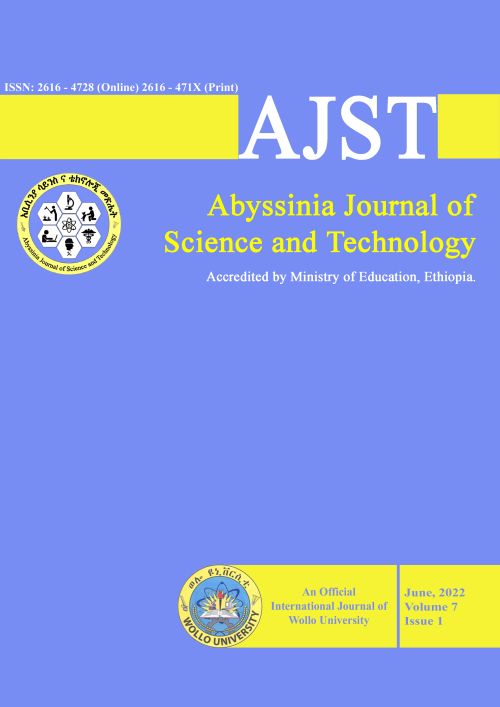Main Article Content
In-vitro antibacterial activity of common spices against isolated lactic acid bacteria and their sensory quality role in fermented camel milk
Abstract
The aim of this study was to evaluate the antibacterial activities of common spices on the growth of lactic acid bacteria (LAB) isolated from camel and the consumer acceptability of adding isolated lactic acid bacteria LAB into fermented camel milk. The experiment was conducted with fifteen isolated LABs and eight commonly used spices in Ethiopia. After clean the spices were grinding with a mill under aseptic conditions in order to obtain spice extracts. The extracts were sieved and sterilized with a membrane and each 50g spice powder was extracted individually in 250mL methanol and distilled autoclaved water for 24 hours. The filtered solvent was evaporated under reduced pressure using a rotary evaporator at 55°C after 24 hours of shaking. The results revealed that different extracted spices at varied concentrations influenced the growth of isolated LABs. P. acidilactici 226NB has the greatest inhibitory zone was obtained in Ground Elder (Nechazmud) and Fenugreek (Abish) at 100, 75, and 50% concentrations. Ground Elder (Nechazmud), Black Pepper (Qundo Berbere), Garlic (Nech Shinkurt), Turmeric (Ird), and Rue (Tena'adam) were all found to inhibit the growth of isolated LABs at a concentration of 25%. Only P. pentosaceus 301A, E. faecium 210NB, L.casei subsp. casei 143NB, and P.acidilactici 226NB revealed a distinct zone at 12.5% concentration of methanol extracted by Paprika Pepper (Berbere), Black Cumin Seeds, Fenugreek (Abish), and Ground Elder. Sensory evaluation of pasteurized fermented camel milk with LAB isolates received moderately positive responses from panelists.The aim of this study was to evaluate the antibacterial activities of common spices on the growth of lactic acid bacteria (LAB) isolated from Ethiopian traditionally fermented camel milk and the consumer acceptability of adding isolated LAB to fermented camel milk. The experiment was conducted at Haramaya University between April and December 2021 with fifteen isolated LABs obtained from the Holeta Agricultural Biotechnology Research Center and eight spices commonly used in Ethiopia. The antibacterial activity of each extracted spice was assessed using the disc diffusion method. Spice extracts were evaluated on different test-isolated LABs at 12.5%, 25%, 50%, 75%, and 100% to check if they had antibacterial activity. The sensory evaluation of the fermented camel milk samples was done by seventeen experienced panelists. The results revealed that different extracted spices at varied concentrations influenced the growth of isolated LABs. Ground elder and fenugreek at 100%, 75%, and 50% concentration for P. acidilactici 226NB had the greatest inhibitory effect recorded. Ground elder, black pepper, garlic, turmeric, and rue inhibited the growth of some LABs at a concentration of 25%. Black cumin seeds, fenugreek, and ground elder at 12.5% concentration inhibited the growth of E. faecium 210NB, P. acidilactici 226NB, and P. pentosaceus 301A, respectively. The sensory evaluation showed isolated LABs received ratings of ‘moderately liked’ and ‘slightly liked’ colour, aroma, texture, taste and overall acceptability from panelists. All methanol extracted spices were positive, while glycosides were negative for Allium Sativum, according to phytochemical results.







